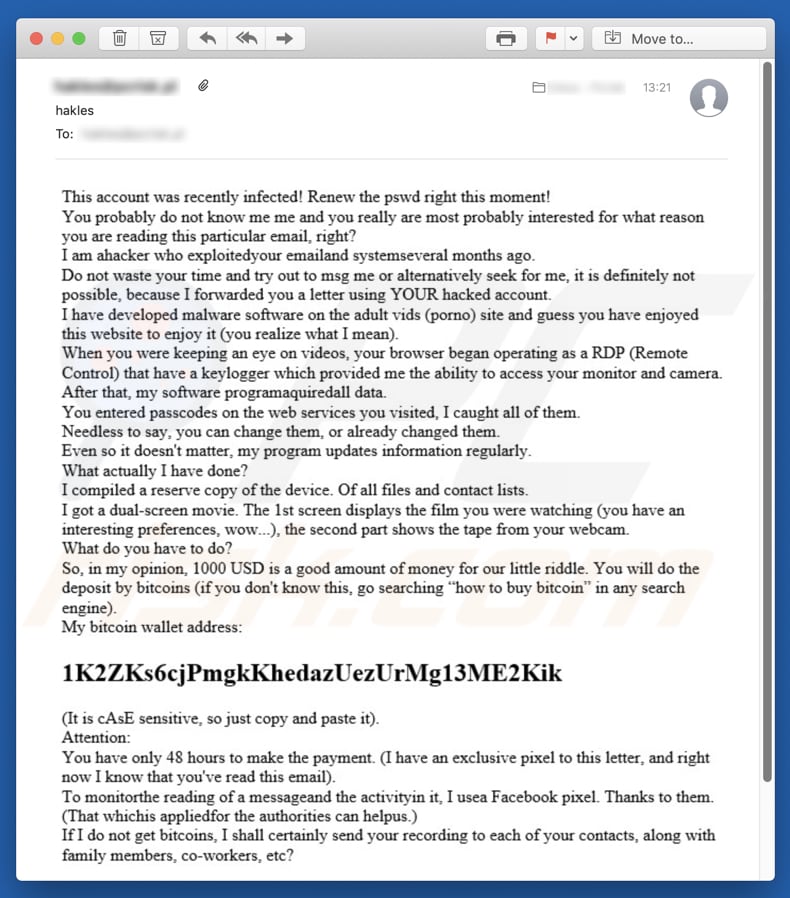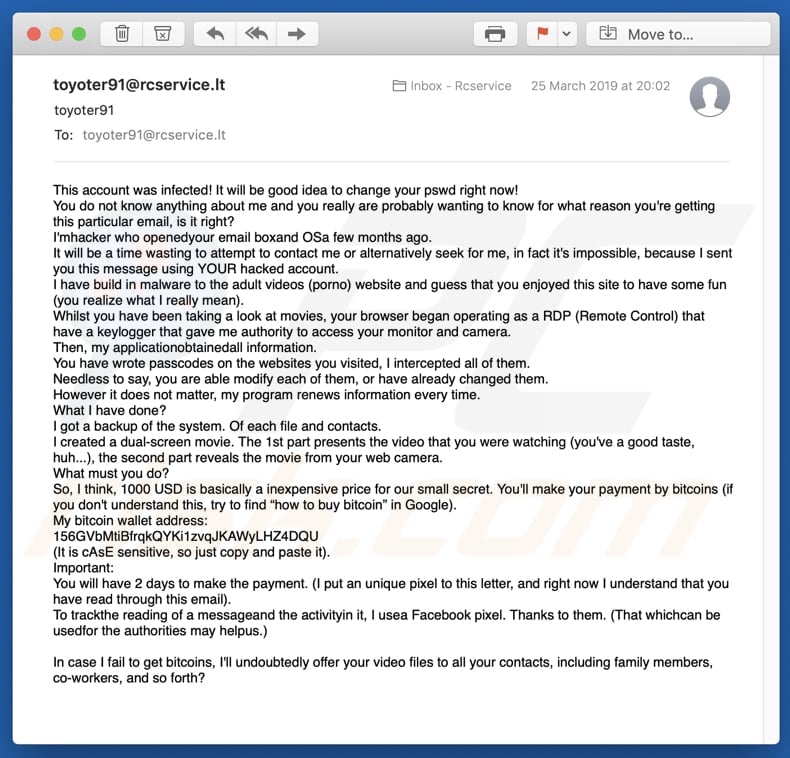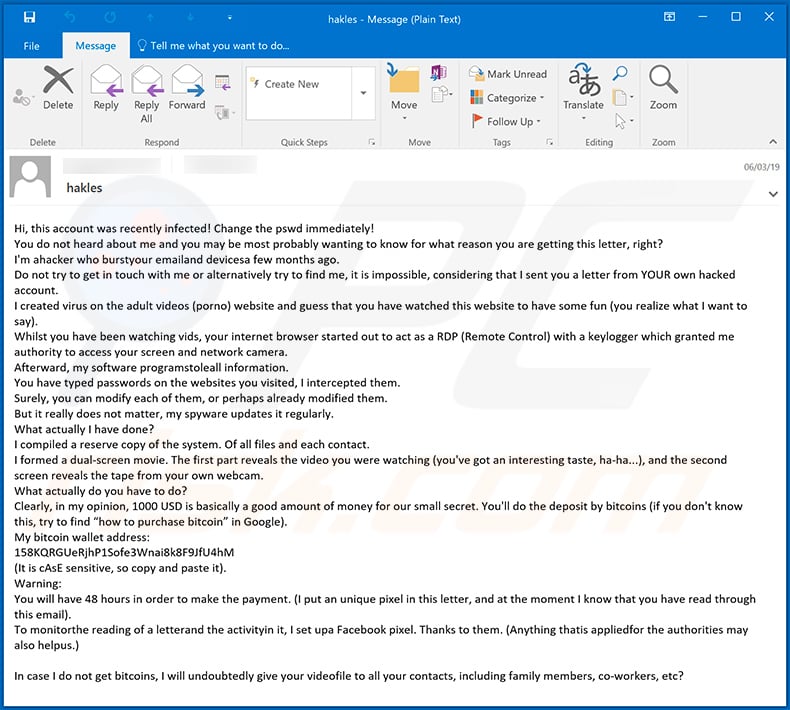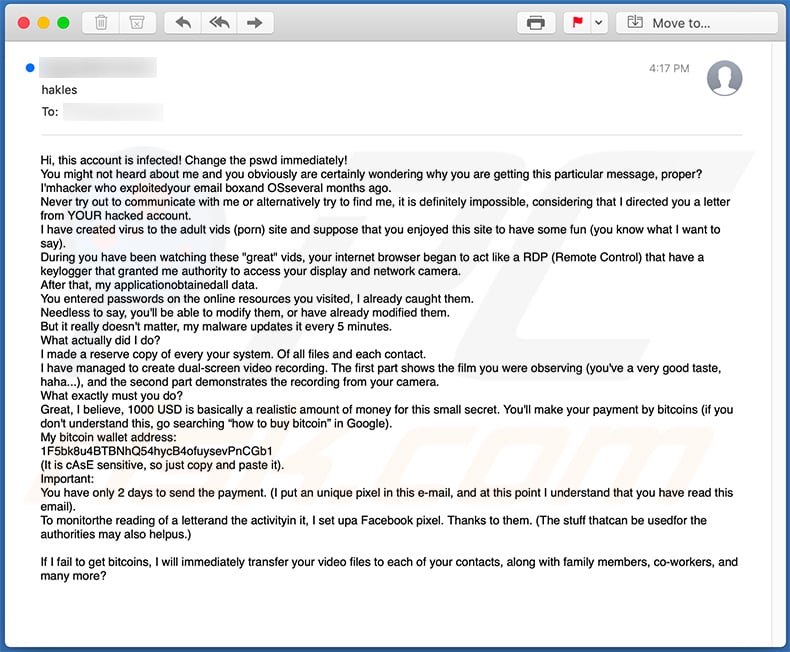This Account Was Recently Infected Email Scam
Phishing/ScamAlso Known As: This Account Was Recently Infected spam
Get free scan and check if your device is infected.
Remove it nowTo use full-featured product, you have to purchase a license for Combo Cleaner. Seven days free trial available. Combo Cleaner is owned and operated by RCS LT, the parent company of PCRisk.com.
What is "This account was recently infected"?
Scammers distribute "This account was recently infected" scam emails to many people hoping that someone will be tricked. The main purpose is to blackmail people by making claims about having recorded a compromising video that they will proliferate unless they receive the requested payment (in a cryptocurrency).
There are many scams of this type, however, this one is somewhat different: rather than containing actual text, it uses an image displaying text. This method is used to bypass spam filters.

The designer of this scam presents himself as a hacker who has supposedly hacked the user's email account. This scammer goes on to claim that he has installed a malicious program into the operating system whilst the recipient was visiting a pornographic website.
This malware works as remote access tool (RAT), a keylogger that is capable of monitoring users' computing activity and recording videos using the computer webcam. It is stated that this program allowed the scammer to steal various passwords.
The main point of this email is to trick people into believing that the aforementioned RAT was used to record a video while the victim was watching a pornographic video. The scammer claims that a dual-screen video has been created, whereby the recipient, and the video he is watching, can be seen simultaneously.
These scammers make threats that they will send these videos to all of the recipient's contacts unless they receive (in this case) $1000 in Bitcoins within 48 hours. A Bitcoin wallet address is also provided. We strongly recommend that you ignore this email. It is simply a scam that should not be trusted.
None of the claims are accurate. Your computer is not infected with malware (or a remote access tool) and your email account has not been hacked. This email should be deleted and all similar emails should also be ignored.
| Name | This Account Was Recently Infected Email Scam |
| Threat Type | Phishing, Scam, Social Engineering, Fraud |
| Symptoms | Unauthorized online purchases, changed online account passwords, identity theft, illegal access of one's computer. |
| Distribution methods | Deceptive emails, rogue online pop-up ads, search engine poisoning techniques, misspelled domains. |
| Damage | Loss of sensitive private information, monetary loss, identity theft. |
| Malware Removal (Windows) |
To eliminate possible malware infections, scan your computer with legitimate antivirus software. Our security researchers recommend using Combo Cleaner. Download Combo CleanerTo use full-featured product, you have to purchase a license for Combo Cleaner. 7 days free trial available. Combo Cleaner is owned and operated by RCS LT, the parent company of PCRisk.com. |
Typically, scammers use these emails to extort money (cryptocurrency) from people by making various threats. They usually claim that they have recorded a compromising video and threaten to distribute it.
Note that "Hey. It's me! Your Future Friend Or Enemy", "I Have A Forum In The Darkweb", and "Your Account Was Hacked" are just some examples of other similar emails (there are many more). Unfortunately, cyber criminals also send emails that contain malicious attachments.
These are usually proliferated to infect computers with malicious programs such as LokiBot, TrickBot, Emotet, AZORult, Adwind, and so on. They send emails that contain web links or attachments such as Microsoft Office or PDF documents, JavaScript files, archives like ZIP, RAR, executables (.exe) files, and so on.
The main purpose of these emails is to trick people into opening the attachments. When opened, they download and install high-risk computer infections. These malicious programs are designed to steal personal details, browsing-related information, spread other viruses, and perform other actions that could lead to financial, data loss, privacy issues, and other problems.
We receive a great deal of feedback from concerned users about this scam email. Here is the most popular question we receive:
Q: Hi pcrisk.com team, I received an email stating that my computer was hacked and they have a video of me. Now they are asking for a ransom in Bitcoins. I think this must be true because they listed my real name and password in the email. What should I do?
A: Do not worry about this email. Neither hackers nor cyber criminals have infiltrated/hacked your computer and there is no video of you watching pornography. Simply ignore the message and do not send any Bitcoins. Your email, name, and password was probably stolen from a compromised website such as Yahoo (these website breaches are common). If you are concerned, you can check if your accounts have been compromised by visiting the haveibeenpwned website.
How do spam campaigns infect computers?
Spam campaigns that contain website links or attachments infect computers only when they are opened/executed. For example, if the attached file is an MS Office document, it will demand permission to enable macros commands (in effect, to disable the "Protected View" mode).
If the recipients gives permission, this allows the malicious document to download and install a computer infection. Similar rules apply to other attachments: an archive file must be extracted and its contents opened/executed, and so on. In summary, no attachment or link can cause a computer infection unless it is opened.
How to avoid installation of malware?
Carefully study each email received, especially if it contains an attachment or link. These emails are usually presented as official and legitimate but are often irrelevant. If an email seems suspicious or received from an unknown address), do not open it.
Furthermore, do not download software using sources such as Peer-to-Peer networks (torrent clients, eMule, and so on), third party downloaders, unofficial websites, and other similar sources. The most secure way is by using official websites (and direct links). Update installed software using implemented functions and tools, and not third party (fake) updaters.
Software "cracking" tools cannot be trusted - they are illegal and often used by cyber criminals to proliferate computer infections. To keep your computer safe, have reputable anti-virus or anti-spyware software installed and keep it enabled at all times. If you have already opened malicious attachments, we recommend running a scan with Combo Cleaner Antivirus for Windows to automatically eliminate infiltrated malware.
Text presented in the "This account was recently infected" email message:
This account was recently infected! Renew the pswd right this moment!
You probably do not know me me and you really are most probably interested for what reason you are reading this particular email, right?
I am a hacker who exploited your email and system several months ago.
Do not waste your time and try out to msg me or alternatively seek for me, it is definitely not possible, because I forwarded you a letter using YOUR hacked account.
I have developed malware software on the adult yids (porno) site and guess you have enjoyed this website to enjoy it (you realize what I mean).
When you were keeping an eye on videos, your browser began operating as a RDP (Remote Control) that have a keylogger which provided me the ability to access your monitor and camera.
After that, my software program acquired all data.
You entered passcodes on the web services you visited, I caught all of them.
Needless to say, you can change them, or already changed them.
Even so it doesn't matter, my program updates information regularly.
What actually I have done?
I compiled a reserve copy of the device. Of all files and contact lists.
I got a dual-screen movie. The 1st screen displays the film you were watching (you have an interesting preferences, wow...), the second part shows the tape from your webcam.
What do you have to do?
So, in my opinion, 1000 USD is a good amount of money for our little riddle. You will do the deposit by bitcoins (if you don't know this, go searching "how to buy bitcoin" in any search engine).
My bitcoin wallet address:
1K2ZICs6cjPmgIcKhedazUezUrMg13ME2Kik, 1LWbhU7623zZjLHTnfTRyrcqbRnXoVKaBd, 135ejHQorMhHYpzgBepgXzrEWQUPgvftNe
(It is cAsE sensitive, so just copy and paste it).
Attention:
You have only 48 hours to make the payment. (I have an exclusive pixel to this letter, and right now I know that you've read this email).
To monitorthe reading of a message and the activity in it, I uses Facebook pixel. Thanks to them. (That which is applied for the authorities can help us.)
If I do not get bitcoins, I shall certainly send your recording to each of your contacts, along with family members, co-workers, etc?
Another variant of this email scam:

Text presented in this variant:
This account was infected! It will be good idea to change your pswd right now!
You do not know anything about me and you really are probably wanting to know for what reason you're getting this particular email, is it right?
I'm hacker who opened your email box and OS a few months ago.
It will be a time wasting to attempt to contact me or alternatively seek for me, in fact it's impossible, because I sent you this message using YOUR hacked account.
I have build in malware to the adult videos (porno) website and guess that you enjoyed this site to have some fun (you realize what I really mean).
Whilst you have been taking a look at movies, your browser began operating as a RDP (Remote Control) that have a keylogger that gave me authority to access your monitor and camera.
Then, my application obtained all information.
You have wrote passcodes on the websites you visited, I intercepted all of them.
Needless to say, you are able modify each of them, or have already changed them.
However it does not matter, my program renews information every time.
What I have done?
I got a backup of the system. Of each file and contacts.
I created a dual-screen movie. The 1st part presents the video that you were watching (you've a good taste, huh...), the second part reveals the movie from your web camera.
What must you do?
So, I think, 1000 USD is basically a inexpensive price for our small secret. You'll make your payment by bitcoins (if you don't understand this, try to find “how to buy bitcoin” in Google).
My bitcoin wallet address:
156GVbMtiBfrqkQYKi1zvqJKAWyLHZ4DQU
(It is cAsE sensitive, so just copy and paste it).
Important:
You will have 2 days to make the payment. (I put an unique pixel to this letter, and right now I understand that you have read through this email).
To track the reading of a message and the activity in it, I use a Facebook pixel. Thanks to them. (That which an be used for the authorities may help us.)In case I fail to get bitcoins, I'll undoubtedly offer your video files to all your contacts, including family members, co-workers, and so forth?
Yet another variant of "This Account Was Recently Infected" scam email:

Text presented within this email:
Hi, this account was recently infected! Change the pswd immediately!
You do not heard about me and you may be most probably wanting to know for what reason you are getting this letter, right?
I'm ahacker who burstyour emailand devicesa few months ago.
Do not try to get in touch with me or alternatively try to find me, it is impossible, considering that I sent you a letter from YOUR own hacked account.
I created virus on the adult videos (porno) website and guess that you have watched this website to have some fun (you realize what I want to say).
Whilst you have been watching vids, your internet browser started out to act as a RDP (Remote Control) with a keylogger which granted me authority to access your screen and network camera.
Afterward, my software programstoleall information.
You have typed passwords on the websites you visited, I intercepted them.
Surely, you can modify each of them, or perhaps already modified them.
But it really does not matter, my spyware updates it regularly.
What actually I have done?
I compiled a reserve copy of the system. Of all files and each contact.
I formed a dual-screen movie. The first part reveals the video you were watching (you've got an interesting taste, ha-ha...), and the second screen reveals the tape from your own webcam.
What actually do you have to do?
Clearly, in my opinion, 1000 USD is basically a good amount of money for our small secret. You'll do the deposit by bitcoins (if you don't know this, try to find “how to purchase bitcoin” in Google).
My bitcoin wallet address:
158KQRGUeRjhP1Sofe3Wnai8k8F9JfU4hM
(It is cAsE sensitive, so copy and paste it).
Warning:
You will have 48 hours in order to make the payment. (I put an unique pixel in this letter, and at the moment I know that you have read through this email).
To monitorthe reading of a letterand the activityin it, I set upa Facebook pixel. Thanks to them. (Anything thatis appliedfor the authorities may also helpus.)In case I do not get bitcoins, I will undoubtedly give your videofile to all your contacts, including family members, co-workers, etc?
One more variant of "This Account Was Recently Infected" scam email:

Text presented within this email:
Hi, this account is infected! Change the pswd immediately!
You might not heard about me and you obviously are certainly wondering why you are getting this particular message, proper?
I'mhacker who exploitedyour email boxand OSseveral months ago.
Never try out to communicate with me or alternatively try to find me, it is definitely impossible, considering that I directed you a letter from YOUR hacked account.
I have created virus to the adult vids (porn) site and suppose that you enjoyed this site to have some fun (you know what I want to say).
During you have been watching these "great" vids, your internet browser began to act like a RDP (Remote Control) that have a keylogger that granted me authority to access your display and network camera.
After that, my applicationobtainedall data.
You entered passwords on the online resources you visited, I already caught them.
Needless to say, you'll be able to modify them, or have already modified them.
But it really doesn't matter, my malware updates it every 5 minutes.
What actually did I do?
I made a reserve copy of every your system. Of all files and each contact.
I have managed to create dual-screen video recording. The first part shows the film you were observing (you've a very good taste, haha...), and the second part demonstrates the recording from your camera.
What exactly must you do?
Great, I believe, 1000 USD is basically a realistic amount of money for this small secret. You'll make your payment by bitcoins (if you don't understand this, go searching “how to buy bitcoin” in Google).
My bitcoin wallet address:
1F5bk8u4BTBNhQ54hycB4ofuysevPnCGb1
(It is cAsE sensitive, so just copy and paste it).
Important:
You have only 2 days to send the payment. (I put an unique pixel in this e-mail, and at this point I understand that you have read this email).
To monitorthe reading of a letterand the activityin it, I set upa Facebook pixel. Thanks to them. (The stuff thatcan be usedfor the authorities may also helpus.)If I fail to get bitcoins, I will immediately transfer your video files to each of your contacts, along with family members, co-workers, and many more?
Instant automatic malware removal:
Manual threat removal might be a lengthy and complicated process that requires advanced IT skills. Combo Cleaner is a professional automatic malware removal tool that is recommended to get rid of malware. Download it by clicking the button below:
DOWNLOAD Combo CleanerBy downloading any software listed on this website you agree to our Privacy Policy and Terms of Use. To use full-featured product, you have to purchase a license for Combo Cleaner. 7 days free trial available. Combo Cleaner is owned and operated by RCS LT, the parent company of PCRisk.com.
Quick menu:
- What is This Account Was Recently Infected spam?
- Types of malicious emails.
- How to spot a malicious email?
- What to do if you fell for an email scam?
Types of malicious emails:
![]() Phishing Emails
Phishing Emails
Most commonly, cybercriminals use deceptive emails to trick Internet users into giving away their sensitive private information, for example, login information for various online services, email accounts, or online banking information.
Such attacks are called phishing. In a phishing attack, cybercriminals usually send an email message with some popular service logo (for example, Microsoft, DHL, Amazon, Netflix), create urgency (wrong shipping address, expired password, etc.), and place a link which they hope their potential victims will click on.
After clicking the link presented in such email message, victims are redirected to a fake website that looks identical or extremely similar to the original one. Victims are then asked to enter their password, credit card details, or some other information that gets stolen by cybercriminals.
![]() Emails with Malicious Attachments
Emails with Malicious Attachments
Another popular attack vector is email spam with malicious attachments that infect users' computers with malware. Malicious attachments usually carry trojans that are capable of stealing passwords, banking information, and other sensitive information.
In such attacks, cybercriminals' main goal is to trick their potential victims into opening an infected email attachment. To achieve this goal, email messages usually talk about recently received invoices, faxes, or voice messages.
If a potential victim falls for the lure and opens the attachment, their computers get infected, and cybercriminals can collect a lot of sensitive information.
While it's a more complicated method to steal personal information (spam filters and antivirus programs usually detect such attempts), if successful, cybercriminals can get a much wider array of data and can collect information for a long period of time.
![]() Sextortion Emails
Sextortion Emails
This is a type of phishing. In this case, users receive an email claiming that a cybercriminal could access the webcam of the potential victim and has a video recording of one's masturbation.
To get rid of the video, victims are asked to pay a ransom (usually using Bitcoin or another cryptocurrency). Nevertheless, all of these claims are false - users who receive such emails should ignore and delete them.
How to spot a malicious email?
While cyber criminals try to make their lure emails look trustworthy, here are some things that you should look for when trying to spot a phishing email:
- Check the sender's ("from") email address: Hover your mouse over the "from" address and check if it's legitimate. For example, if you received an email from Microsoft, be sure to check if the email address is @microsoft.com and not something suspicious like @m1crosoft.com, @microsfot.com, @account-security-noreply.com, etc.
- Check for generic greetings: If the greeting in the email is "Dear user", "Dear @youremail.com", "Dear valued customer", this should raise suspiciousness. Most commonly, companies call you by your name. Lack of this information could signal a phishing attempt.
- Check the links in the email: Hover your mouse over the link presented in the email, if the link that appears seems suspicious, don't click it. For example, if you received an email from Microsoft and the link in the email shows that it will go to firebasestorage.googleapis.com/v0... you shouldn't trust it. It's best not to click any links in the emails but to visit the company website that sent you the email in the first place.
- Don't blindly trust email attachments: Most commonly, legitimate companies will ask you to log in to their website and to view any documents there; if you received an email with an attachment, it's a good idea to scan it with an antivirus application. Infected email attachments are a common attack vector used by cybercriminals.
To minimise the risk of opening phishing and malicious emails we recommend using Combo Cleaner Antivirus for Windows.
Example of a spam email:

What to do if you fell for an email scam?
- If you clicked on a link in a phishing email and entered your password - be sure to change your password as soon as possible. Usually, cybercriminals collect stolen credentials and then sell them to other groups that use them for malicious purposes. If you change your password in a timely manner, there's a chance that criminals won't have enough time to do any damage.
- If you entered your credit card information - contact your bank as soon as possible and explain the situation. There's a good chance that you will need to cancel your compromised credit card and get a new one.
- If you see any signs of identity theft - you should immediately contact the Federal Trade Commission. This institution will collect information about your situation and create a personal recovery plan.
- If you opened a malicious attachment - your computer is probably infected, you should scan it with a reputable antivirus application. For this purpose, we recommend using Combo Cleaner Antivirus for Windows.
- Help other Internet users - report phishing emails to Anti-Phishing Working Group, FBI’s Internet Crime Complaint Center, National Fraud Information Center and U.S. Department of Justice.
Share:

Tomas Meskauskas
Expert security researcher, professional malware analyst
I am passionate about computer security and technology. I have an experience of over 10 years working in various companies related to computer technical issue solving and Internet security. I have been working as an author and editor for pcrisk.com since 2010. Follow me on Twitter and LinkedIn to stay informed about the latest online security threats.
PCrisk security portal is brought by a company RCS LT.
Joined forces of security researchers help educate computer users about the latest online security threats. More information about the company RCS LT.
Our malware removal guides are free. However, if you want to support us you can send us a donation.
DonatePCrisk security portal is brought by a company RCS LT.
Joined forces of security researchers help educate computer users about the latest online security threats. More information about the company RCS LT.
Our malware removal guides are free. However, if you want to support us you can send us a donation.
Donate
▼ Show Discussion